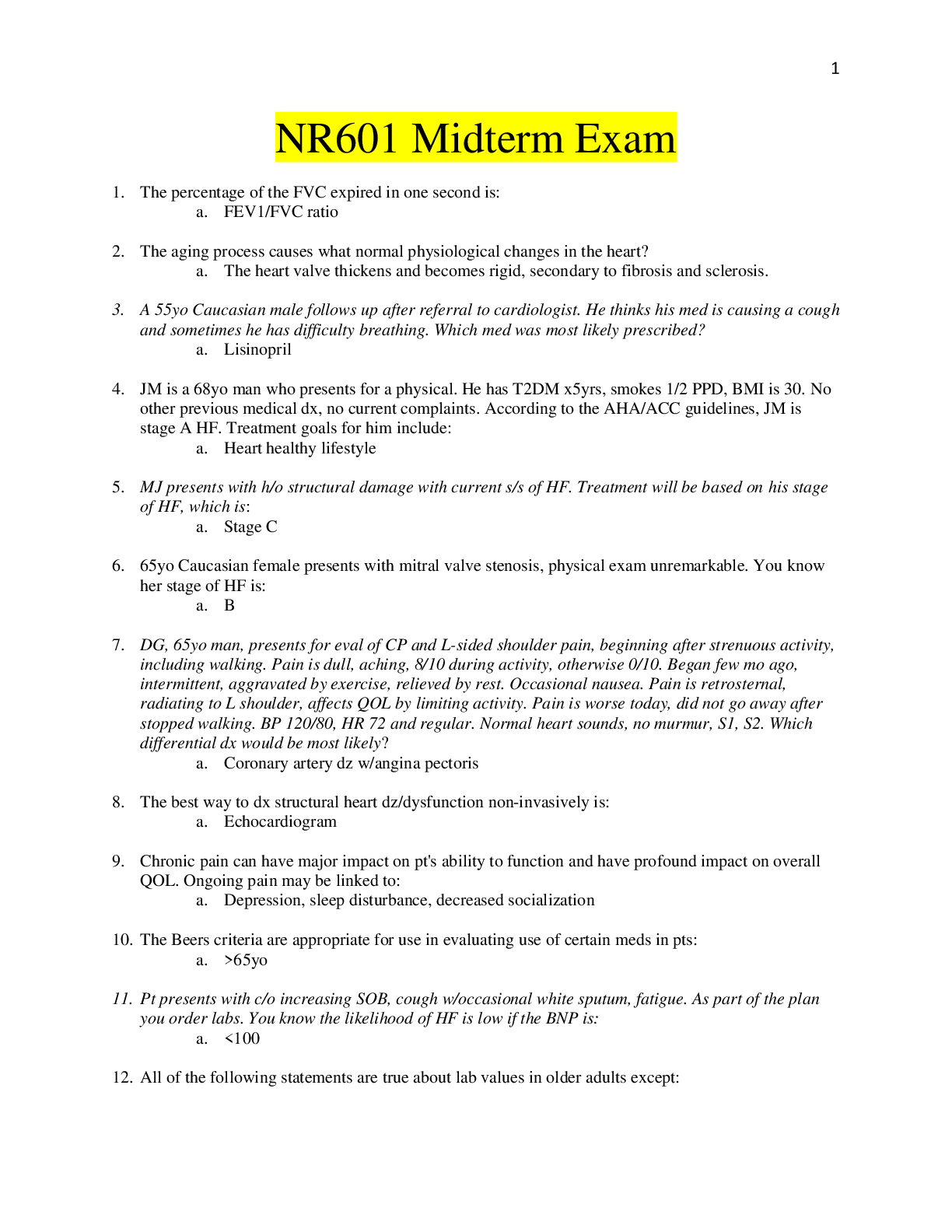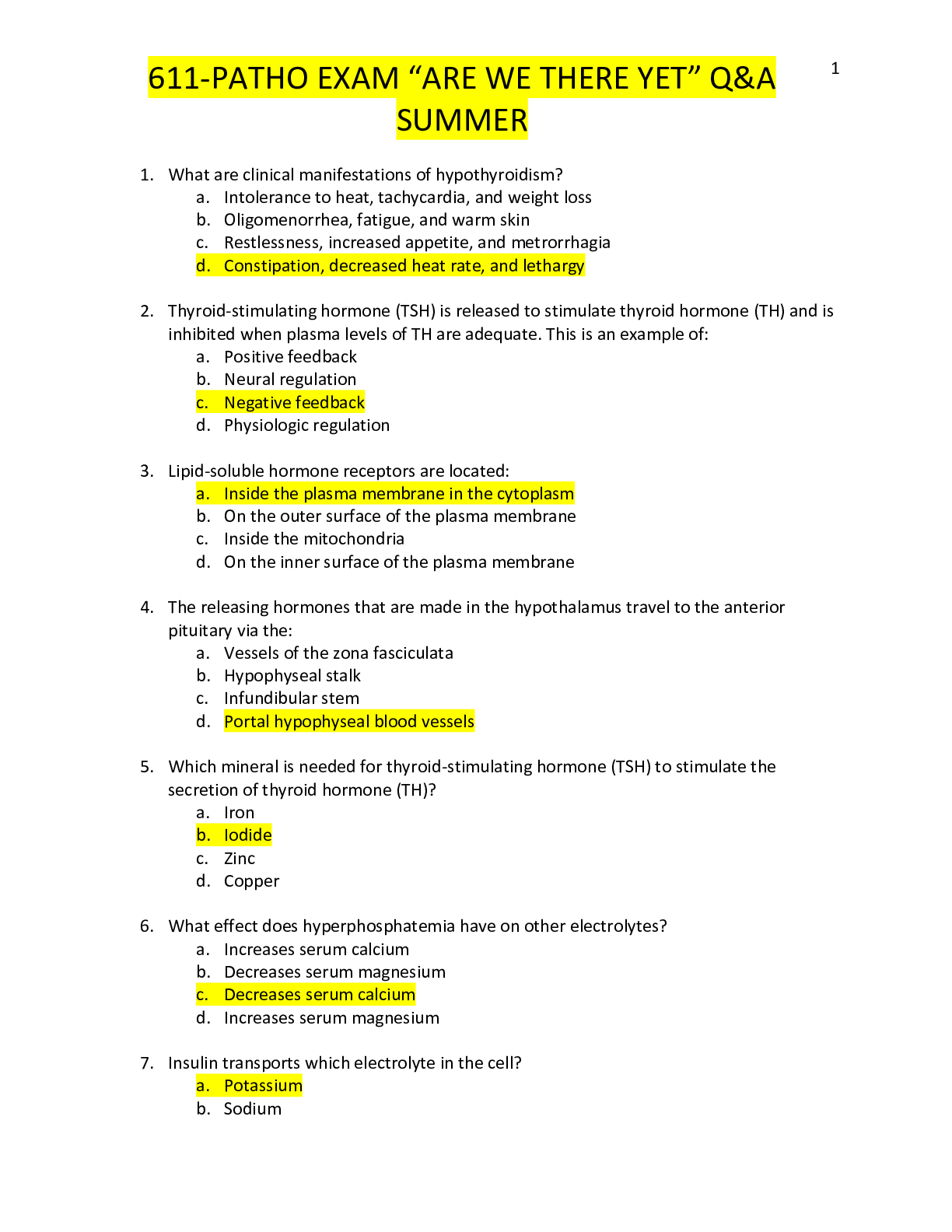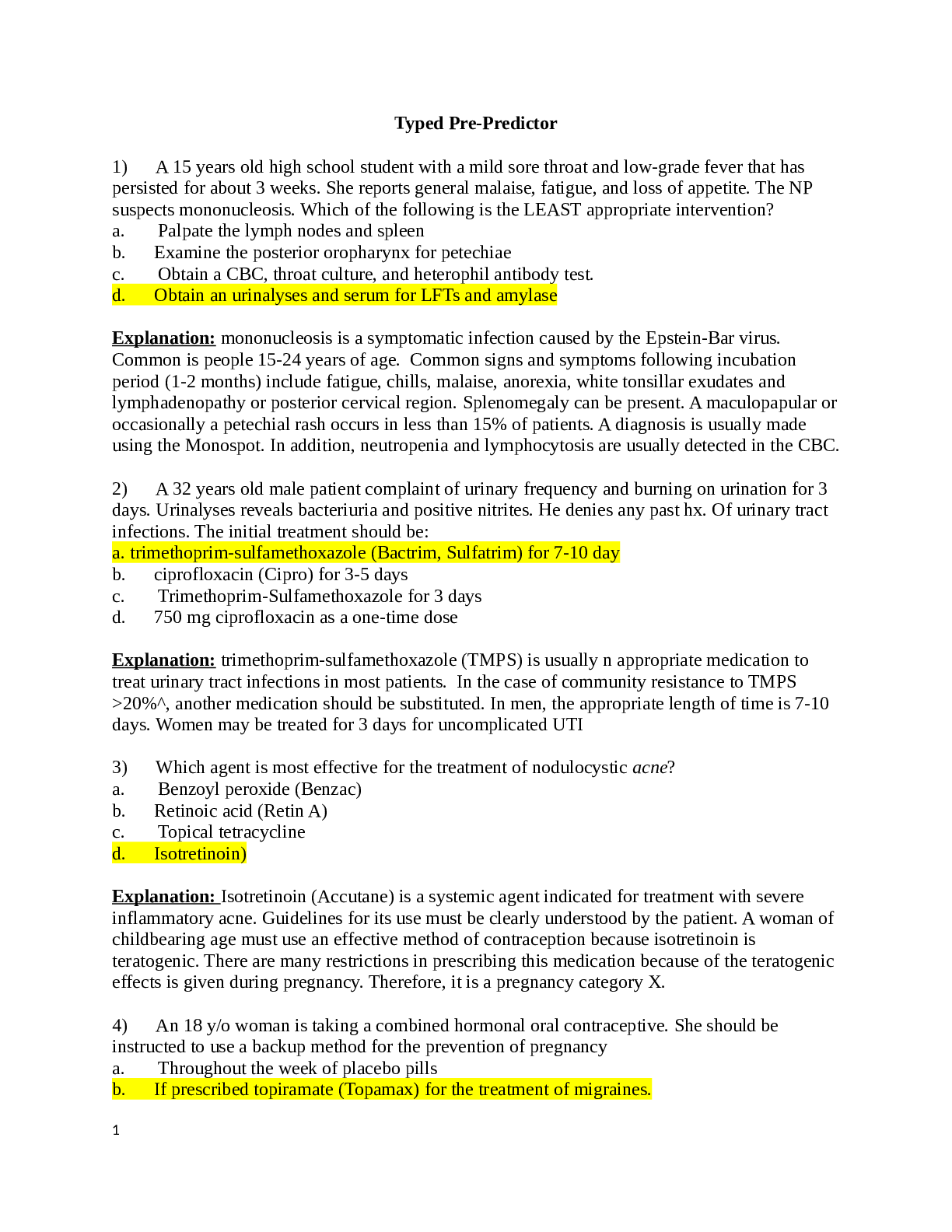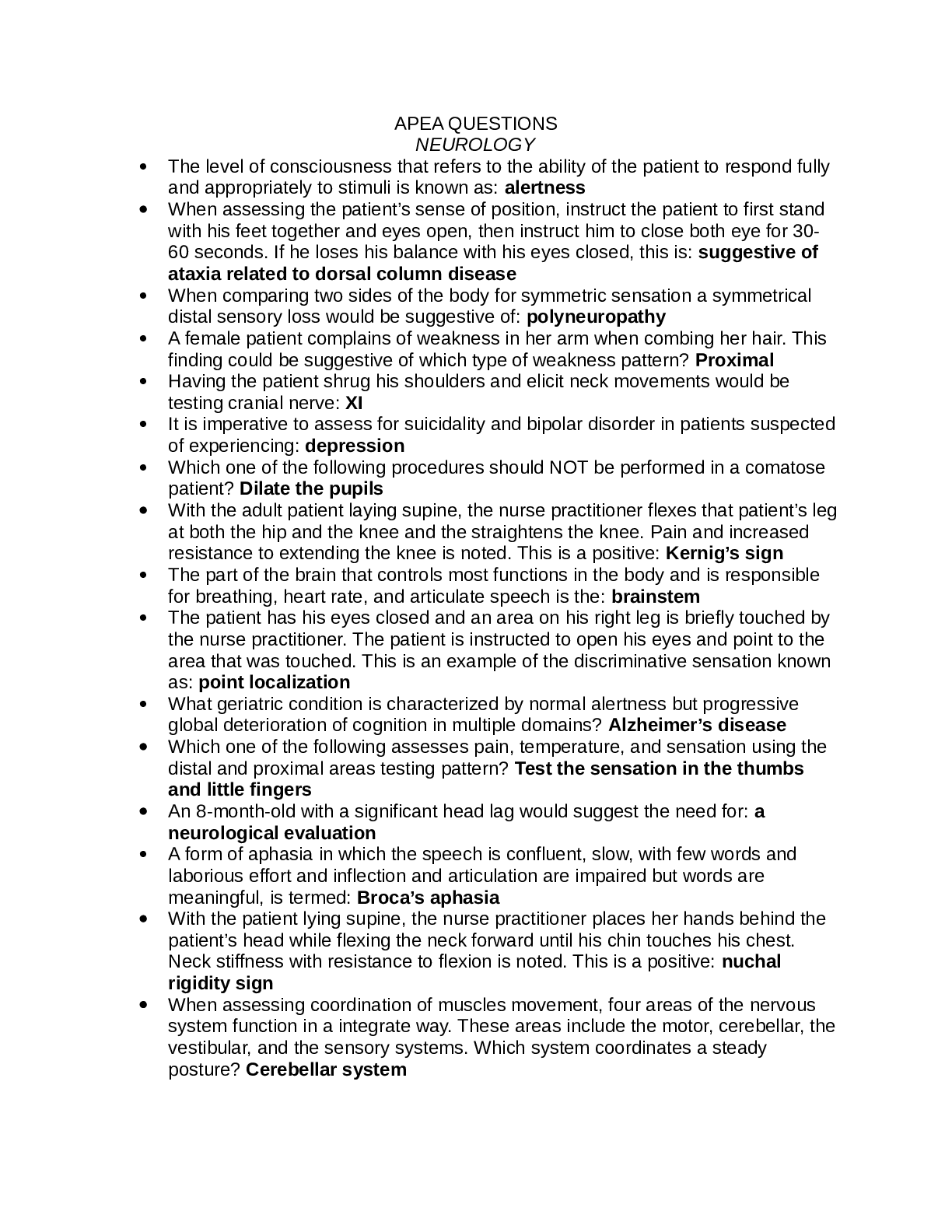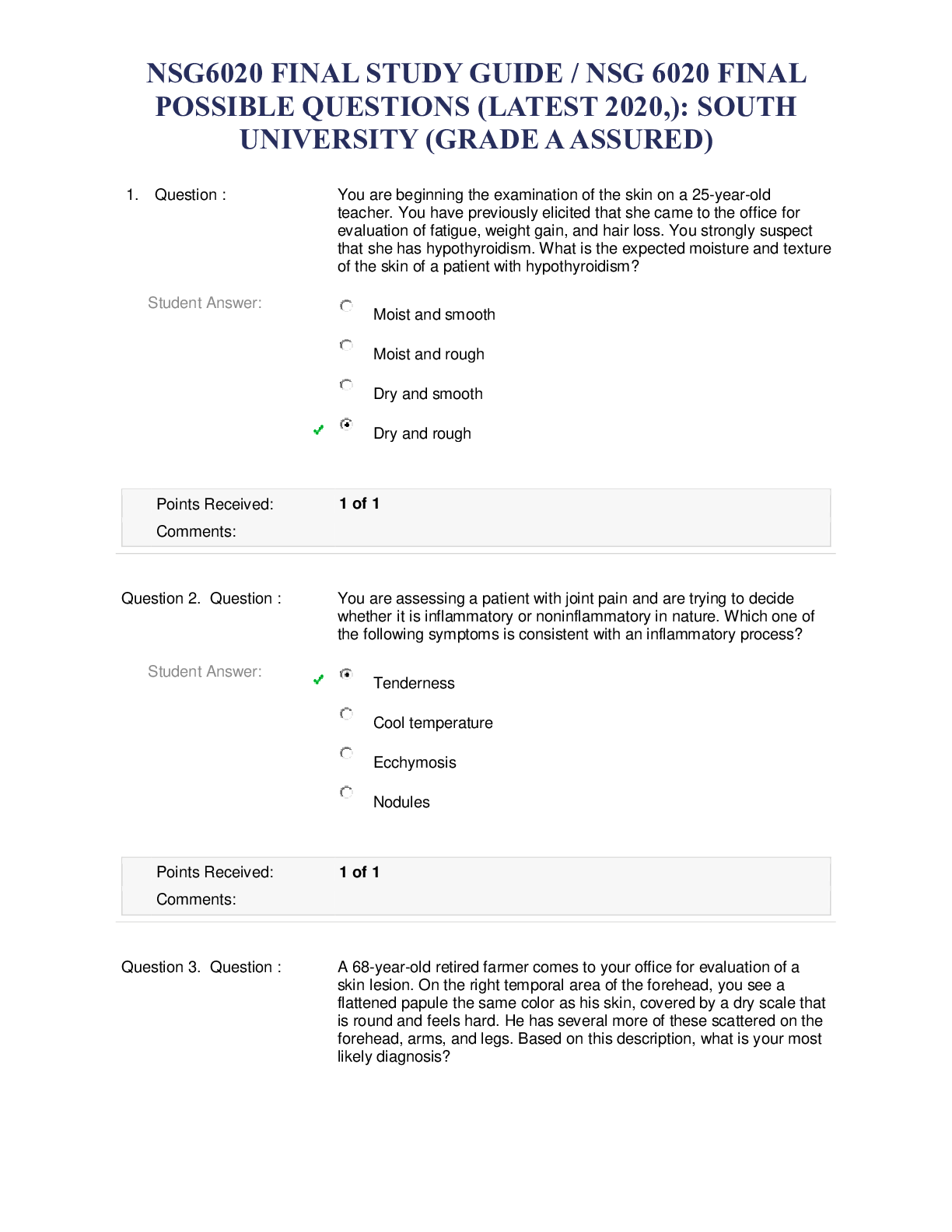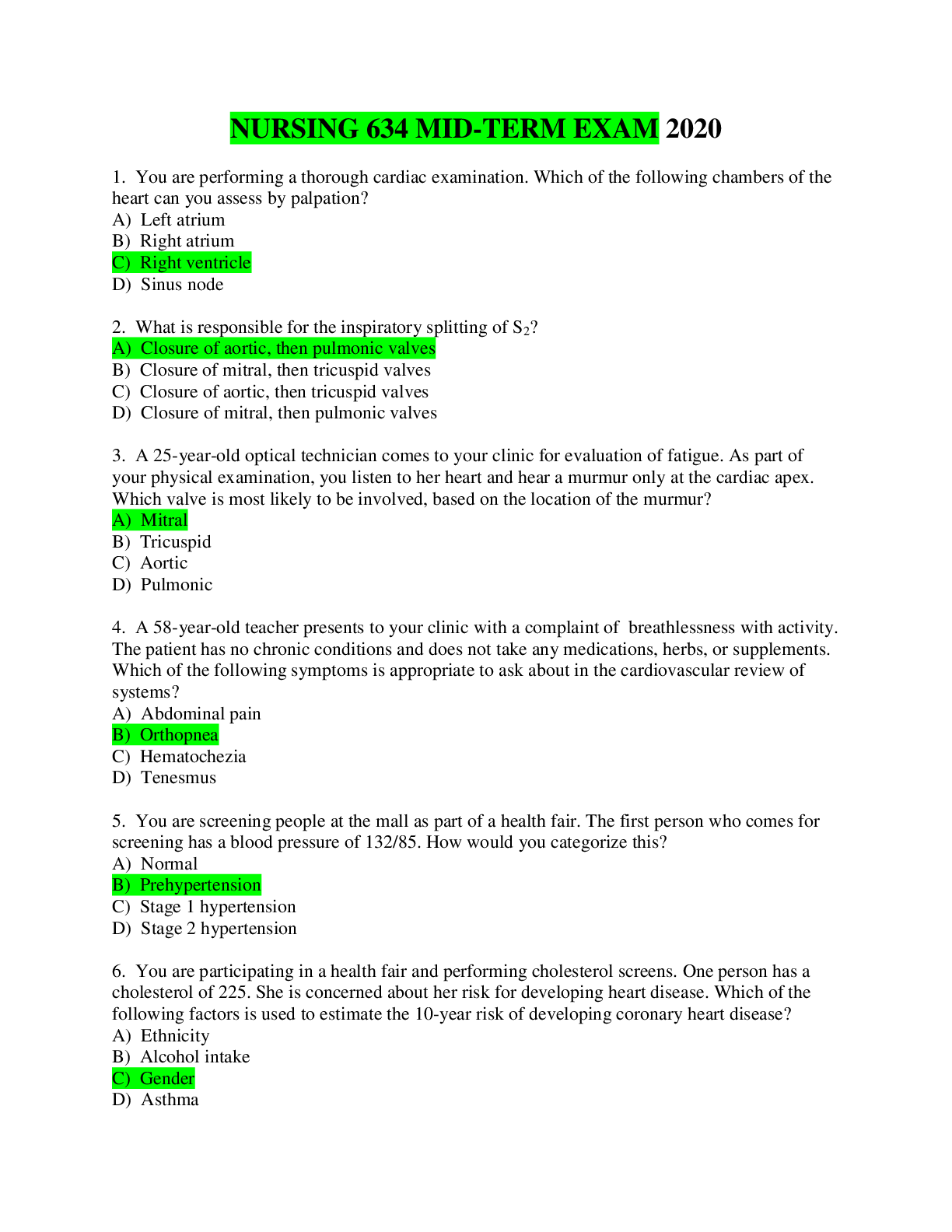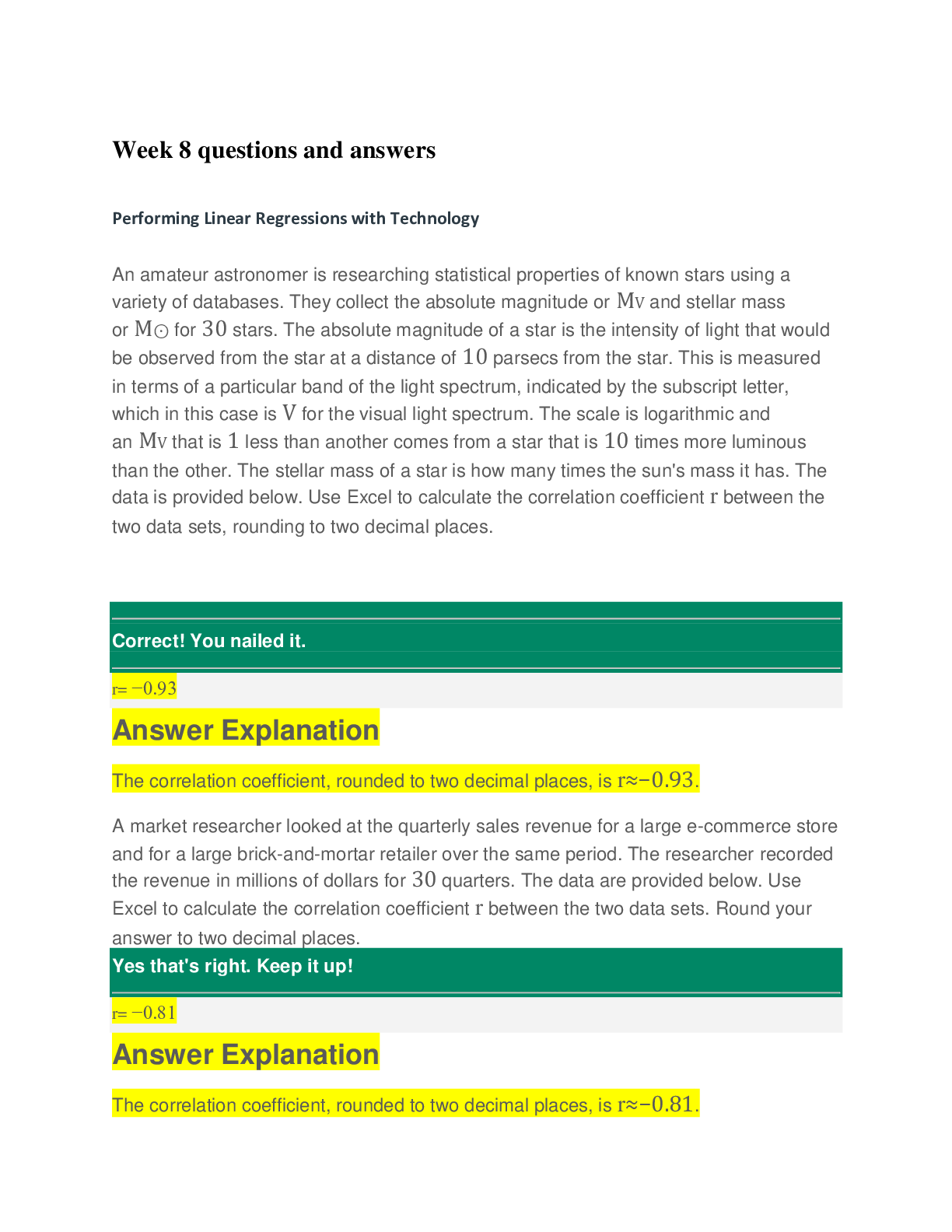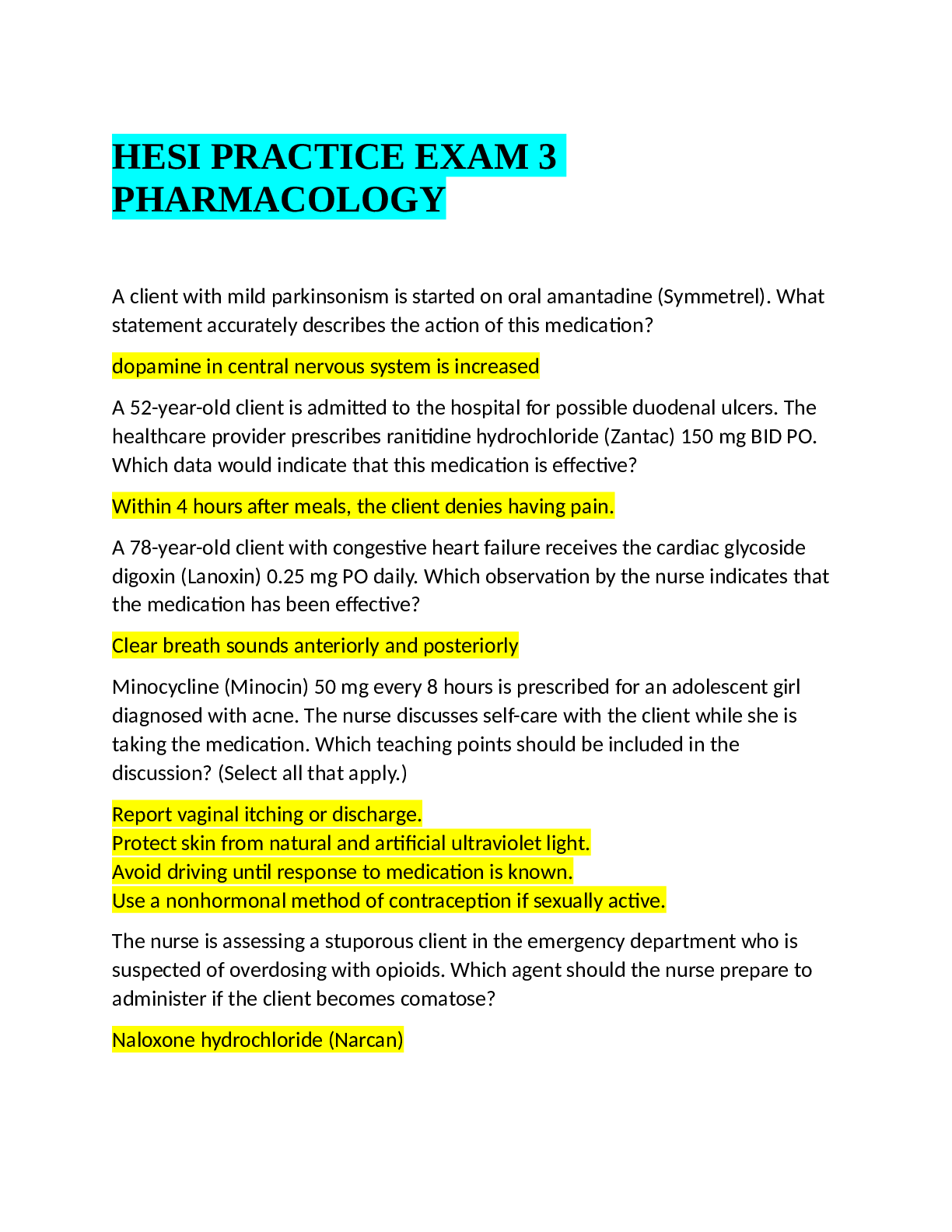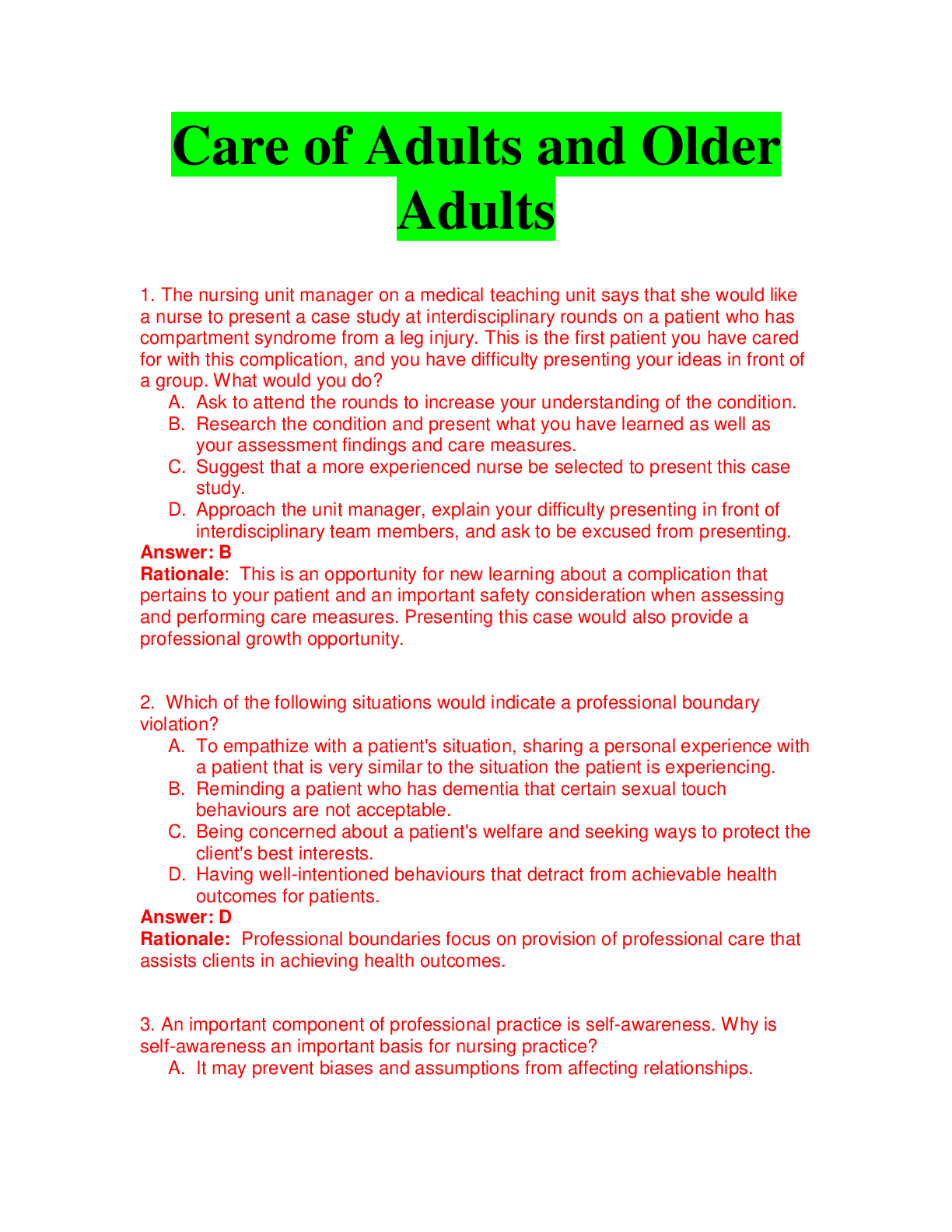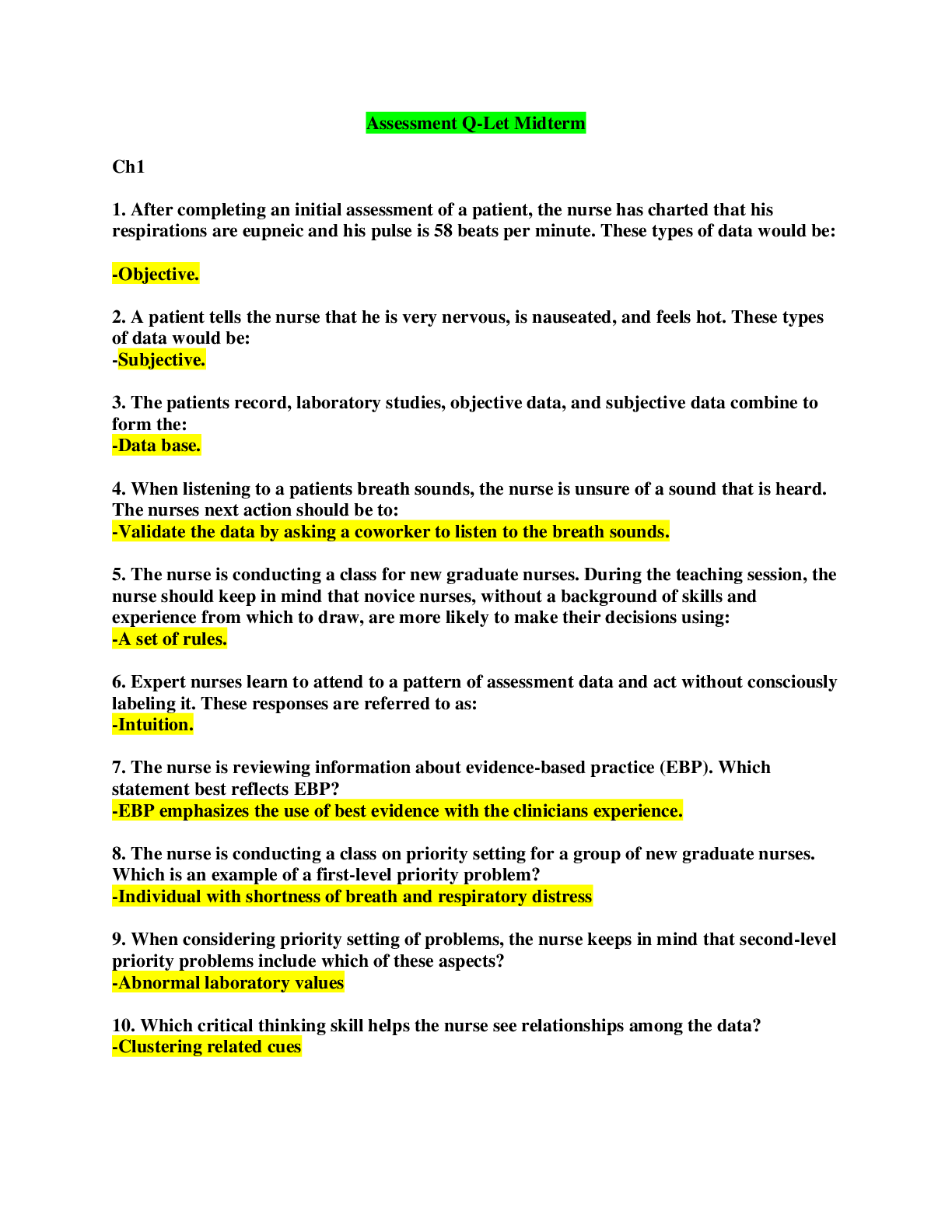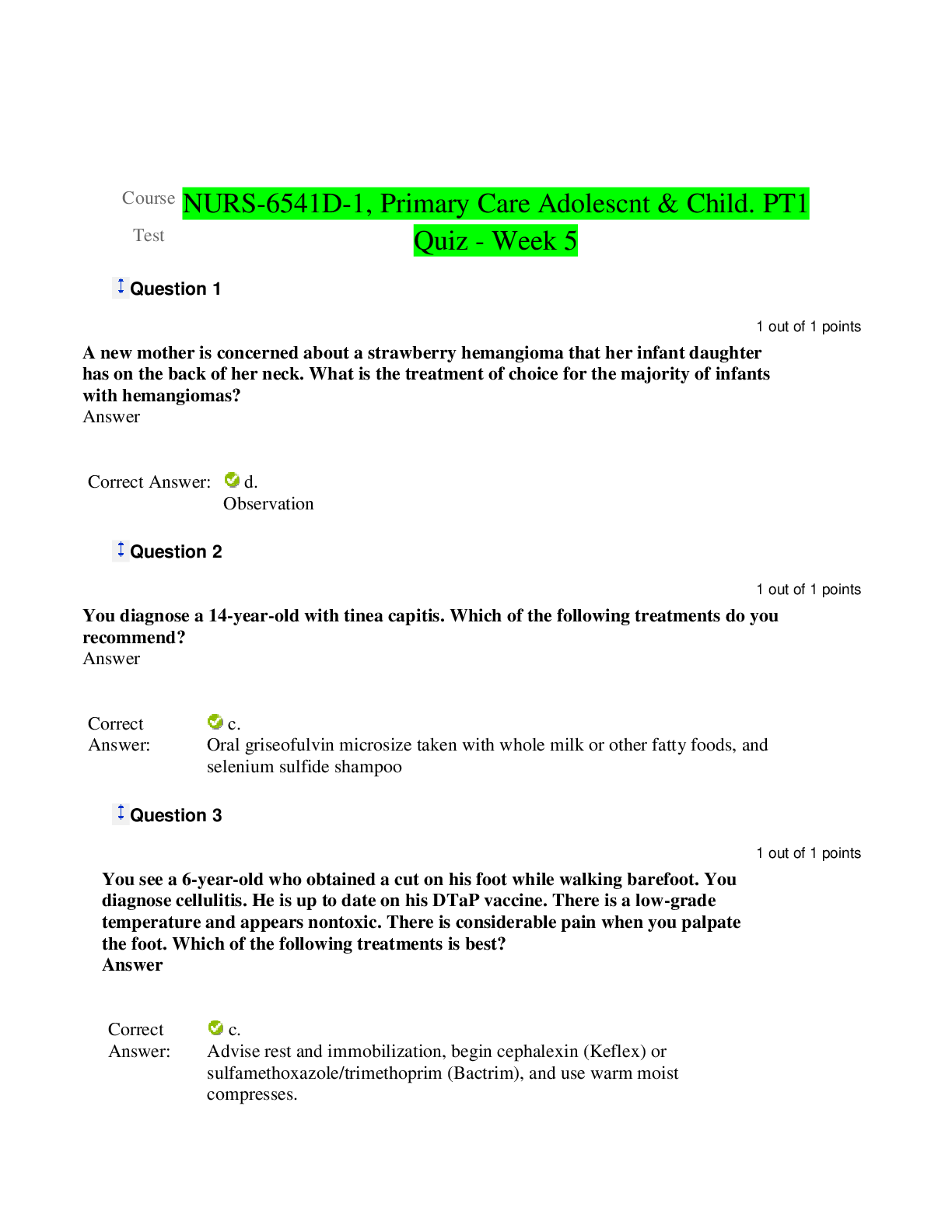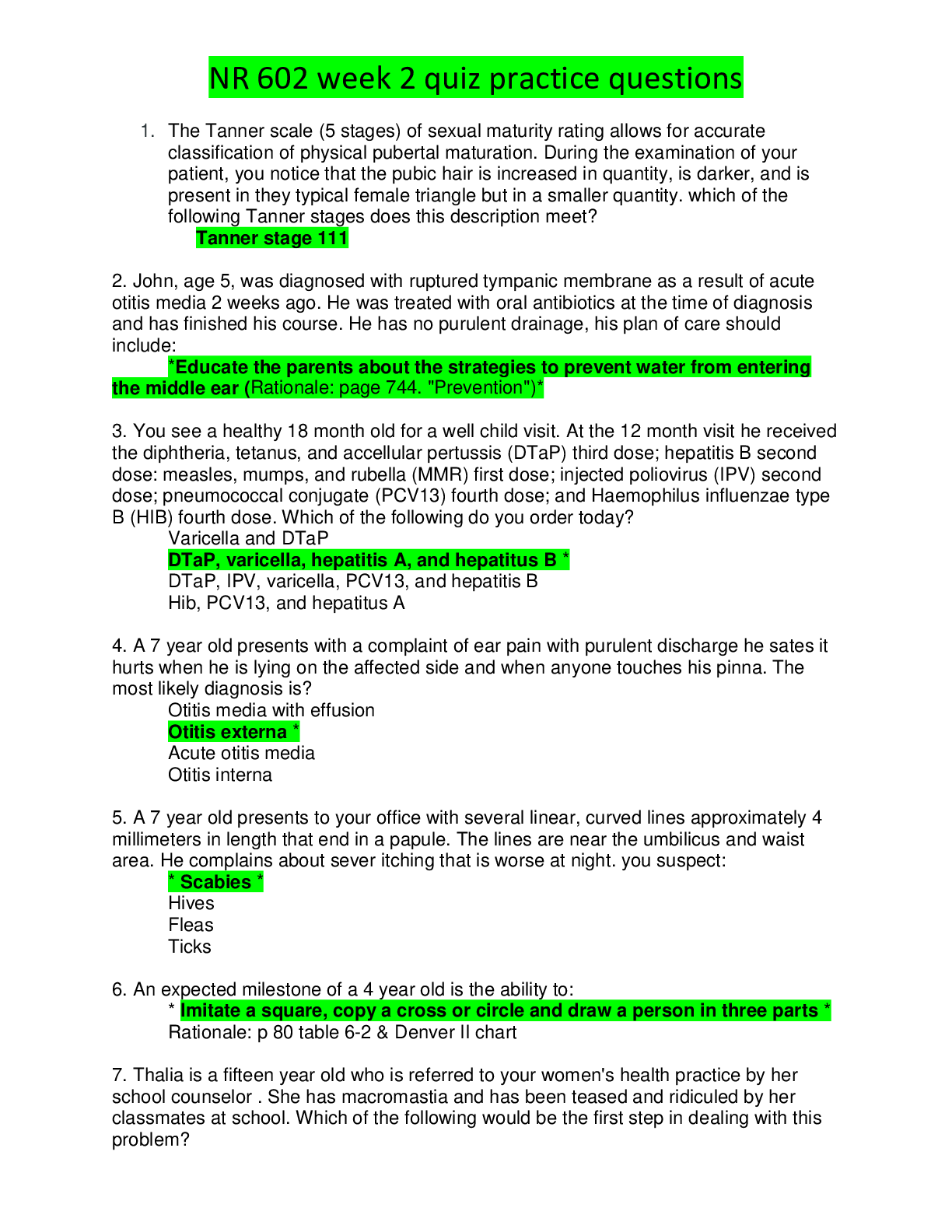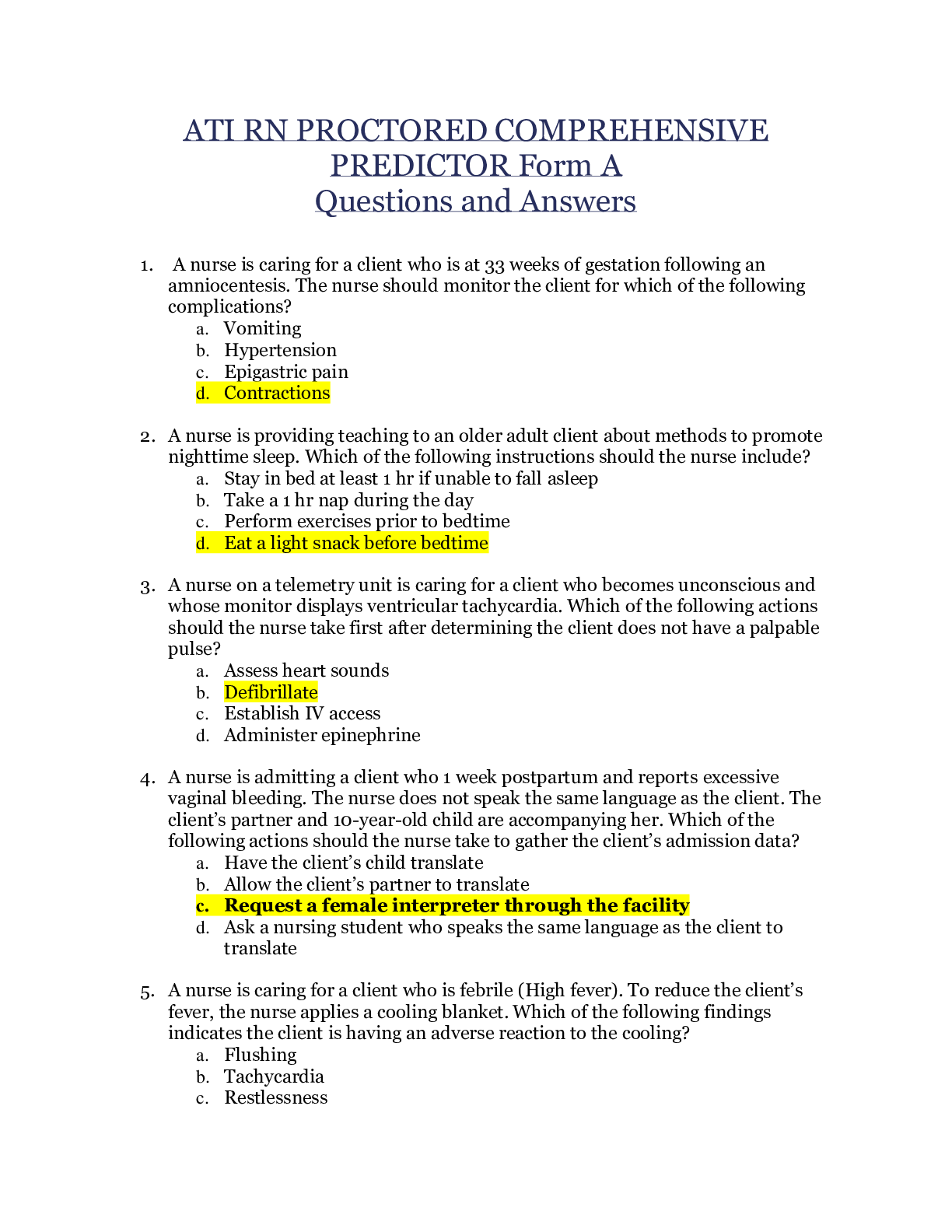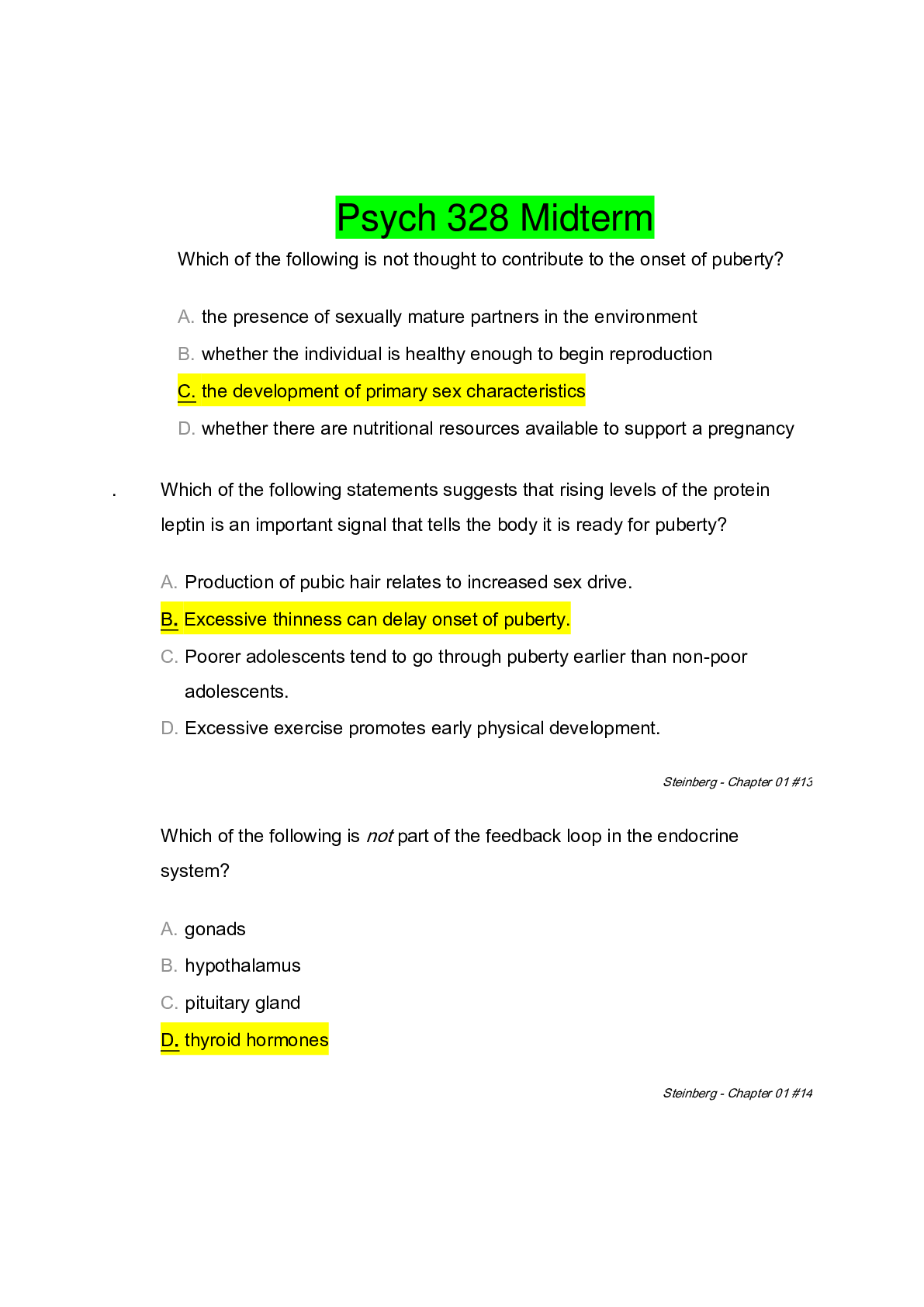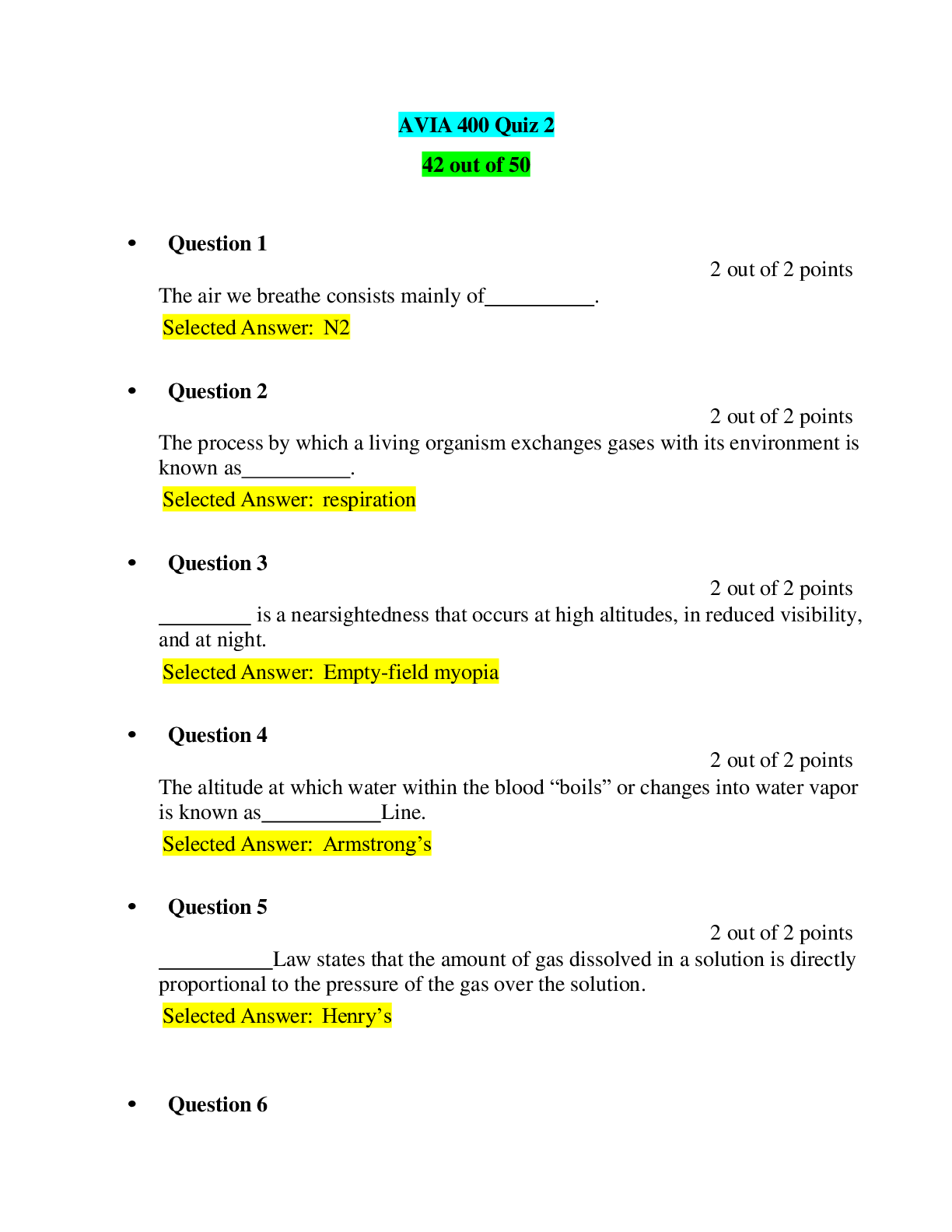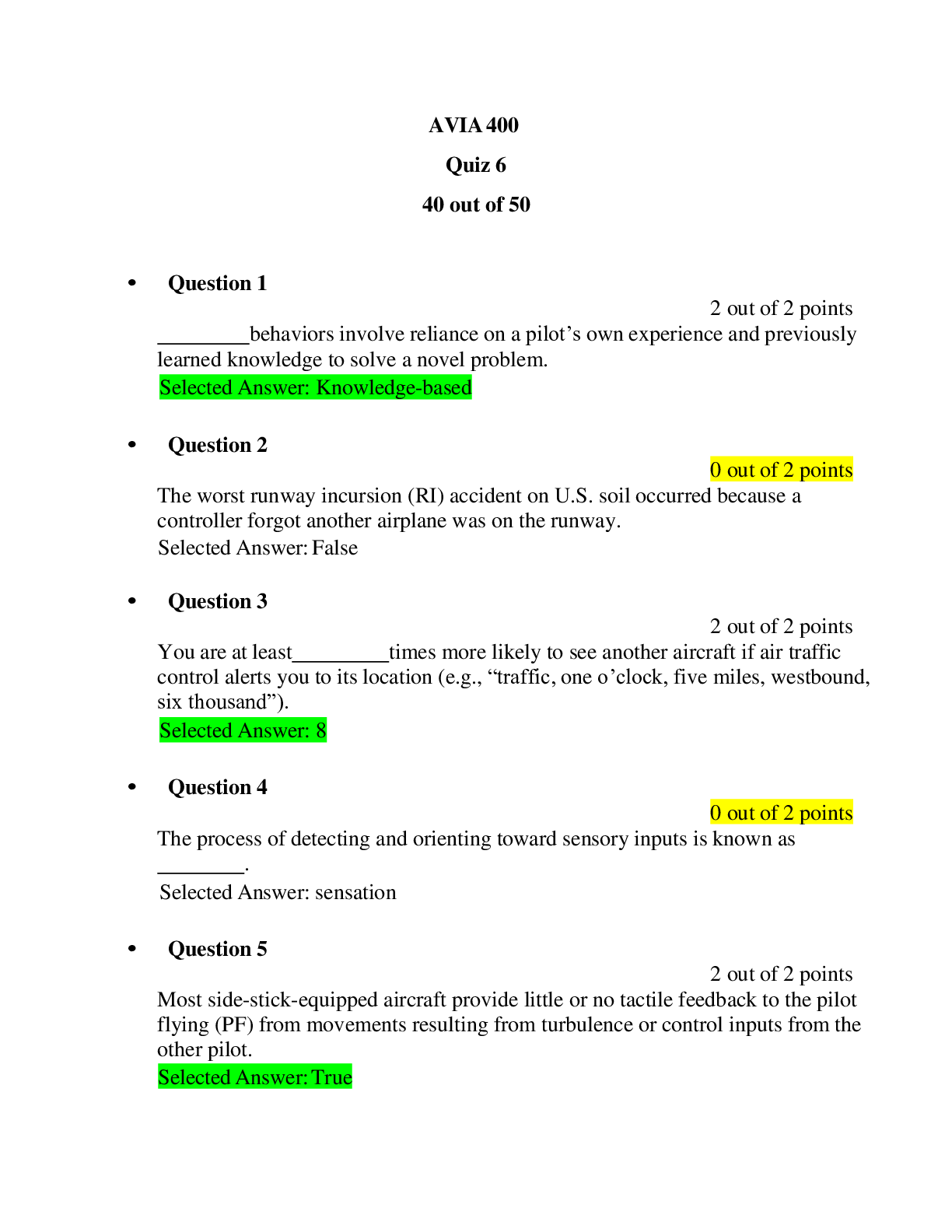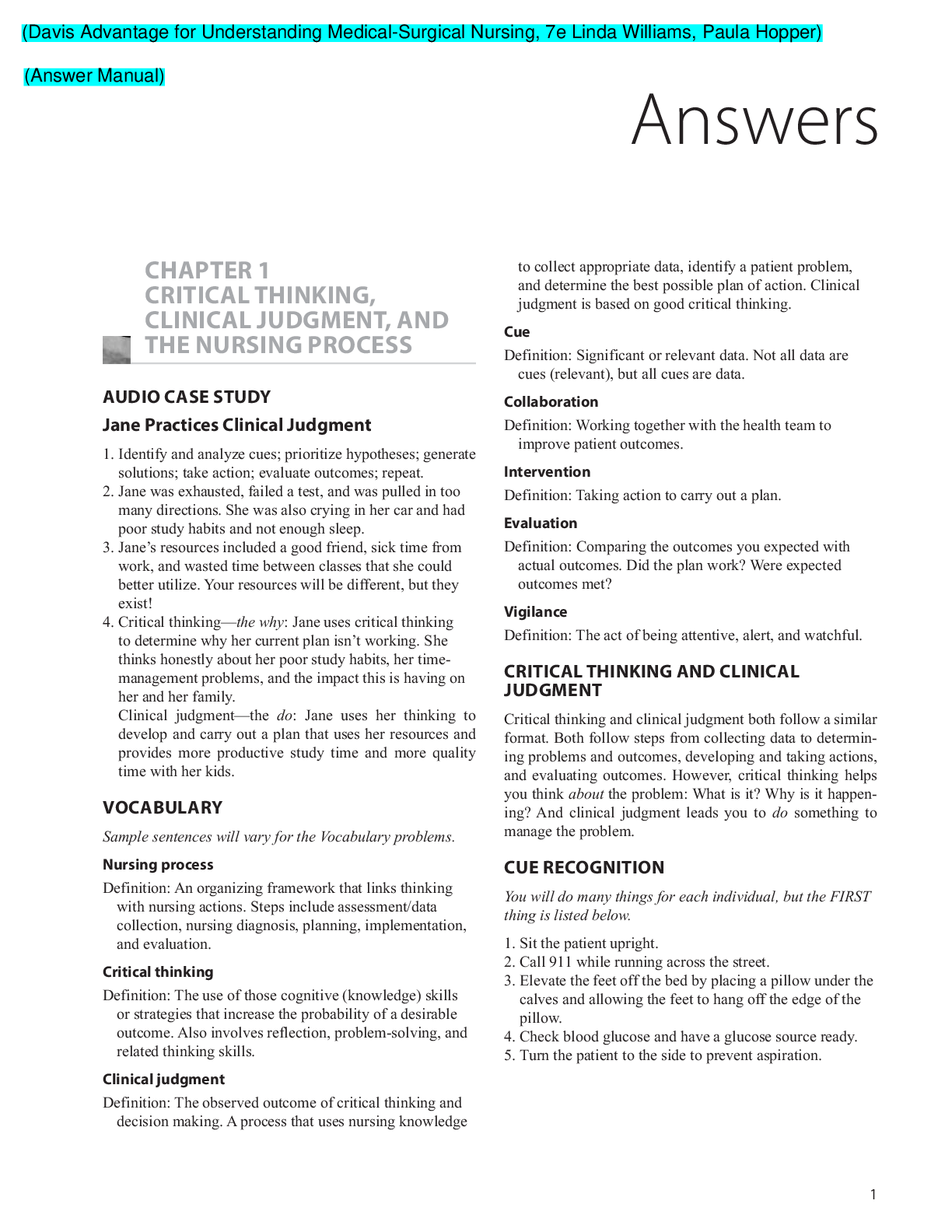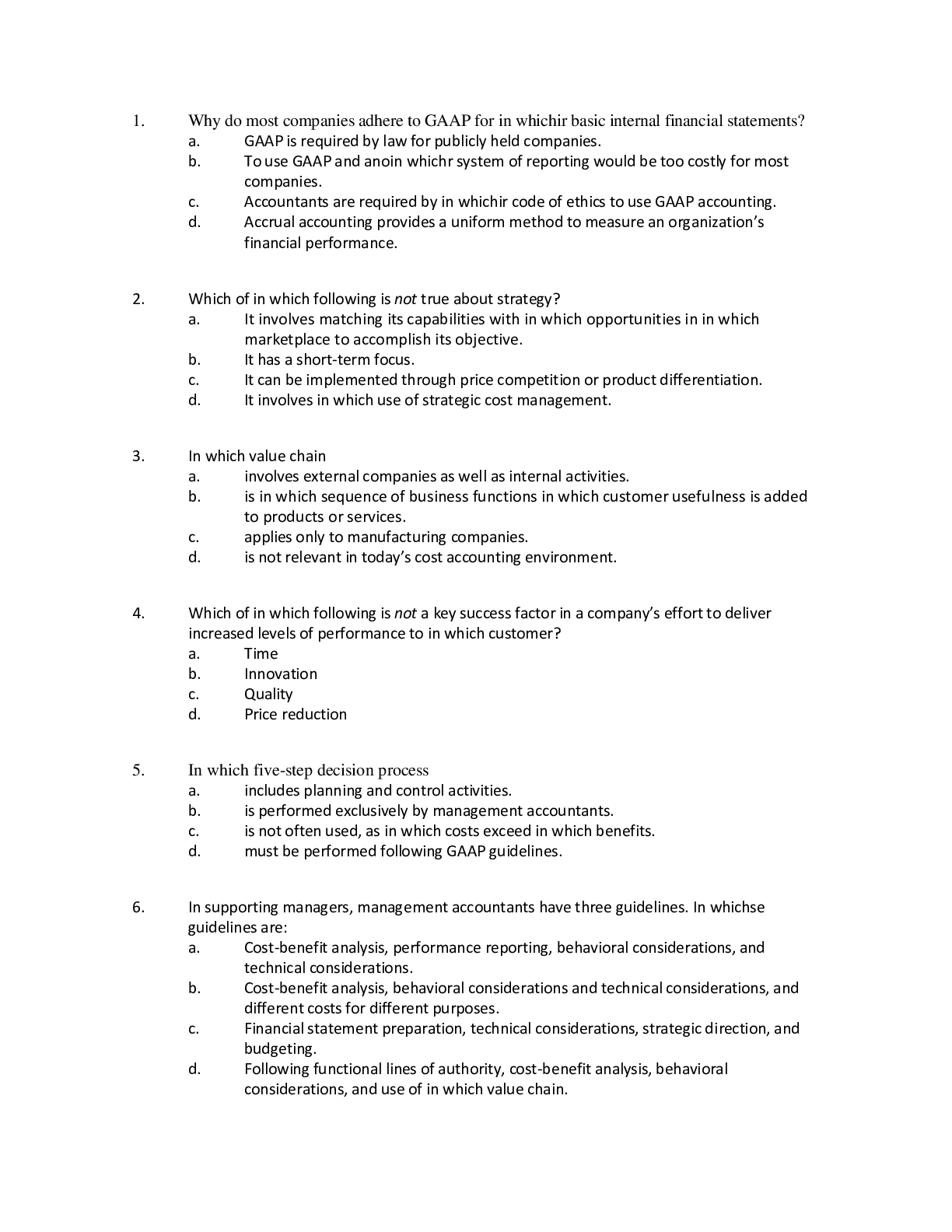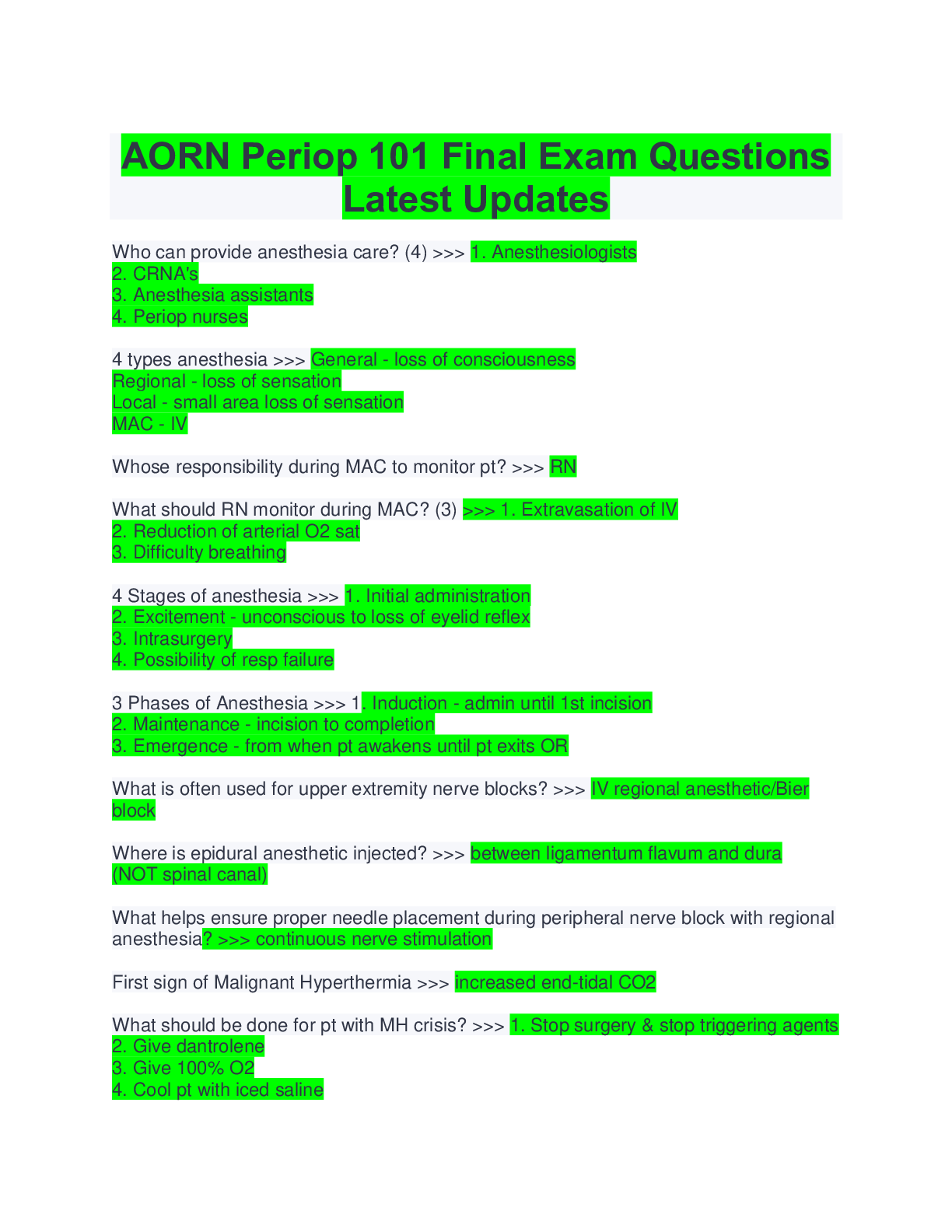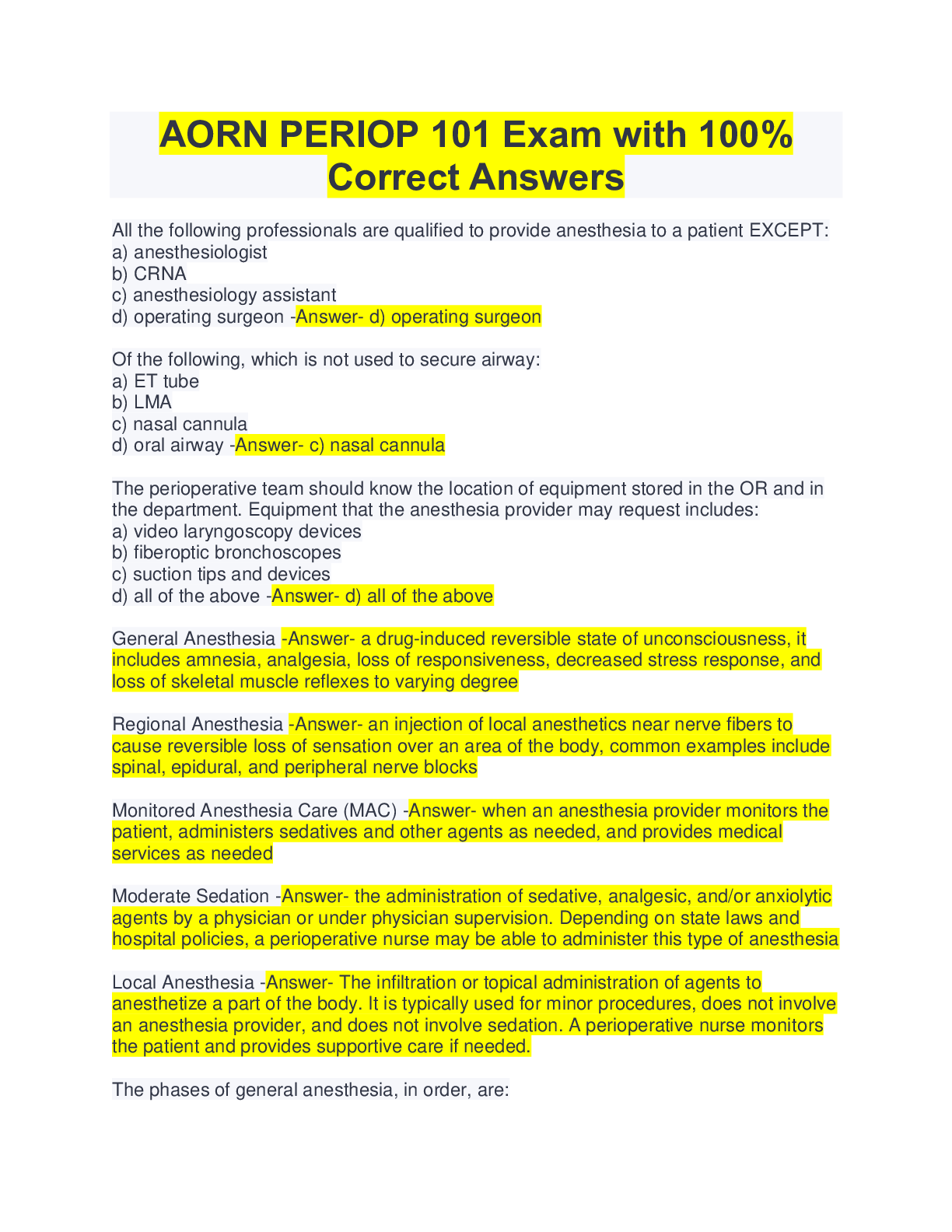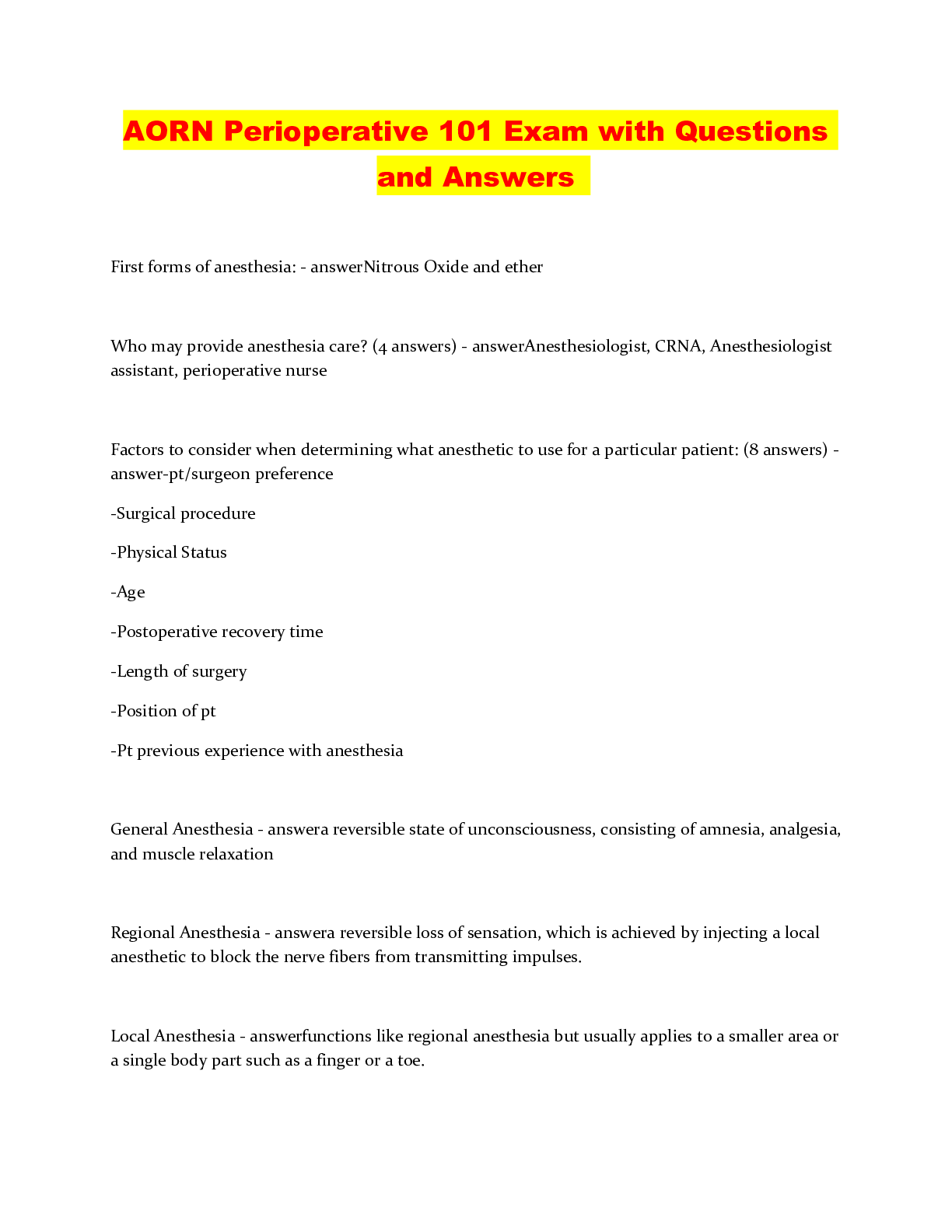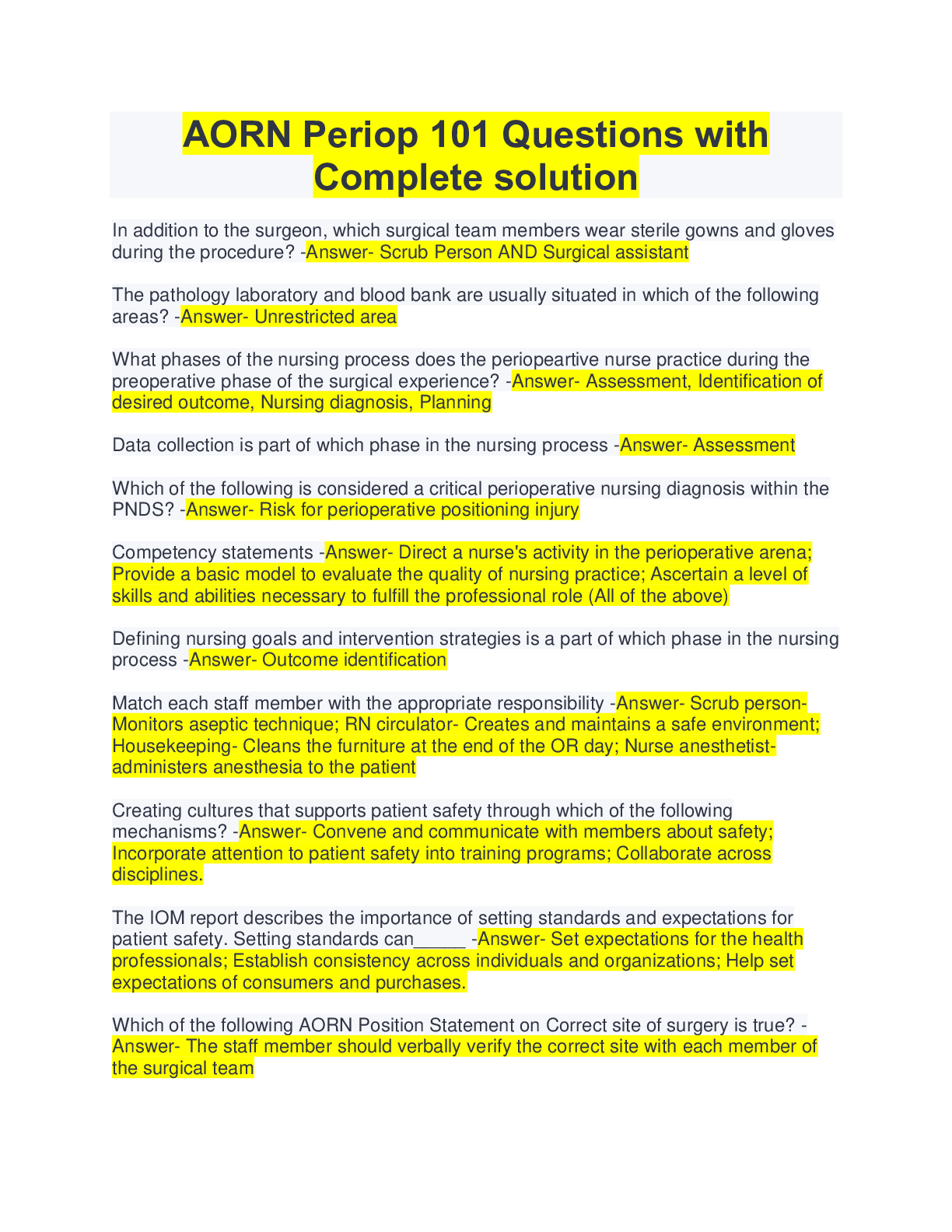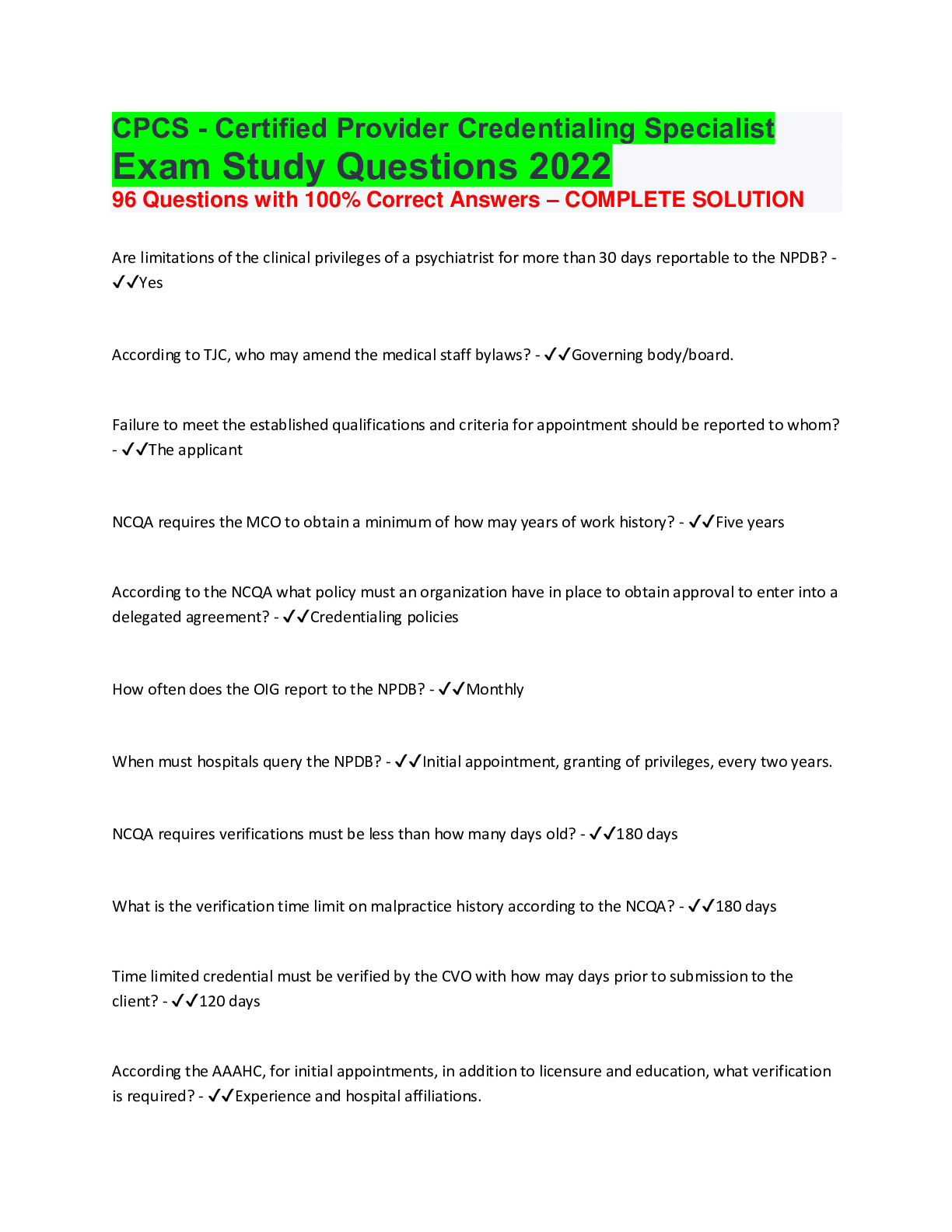*NURSING > QUESTIONS & ANSWERS > Chapter 10--Stress, Coping, and Adaptation (All)
Chapter 10--Stress, Coping, and Adaptation
Document Content and Description Below
Chapter 10--Stress, Coping, and Adaptation MULTIPLE CHOICE 1. A client tells the nurse that he feels “stressed out.” The nurse realizes which of the following regarding stress? 1. Stress ... can be caused by a variety of situations. 2. Stressors do not cause a need for change. 3. Positive events do not increase stress. 4. All events are regarded as threatening to self. PTS: 1 DIF: Analyze REF: Stress Stimulus-Response Theory 2. A client’s symptoms are consistent with those seen in the first stage of the general adaptation syndrome (GAS). Which of the following symptoms did the nurse most likely assess in this client? 1. Mental exhaustion, cool skin, and decreased senses 2. Elevation of blood pressure, dilated pupils, and tachycardia 3. Hyperventilation, nausea, and vomiting 4. Physical illness, hypertension, and shortness of breath PTS: 1 DIF: Analyze REF: Table 10-1 Fight or Flight Responses to Stress 3. The nurse is concerned that a client is in the third stage of the general adaptation syndrome (GAS) when which of the following is assessed? 1. Increased energy 2. Fluid retention 3. Prolonged stress 4. Numbing effect PTS: 1 DIF: Analyze REF: Stress Stimulus-Response Theory 4. The nurse determines that a client is utilizing a maladaptive method to cope with a new illness. Which of the following is the client most likely demonstrating? 1. Crying 2. Exercising 3. Reading 4. Sleeping PTS: 1 DIF: Analyze REF: Coping 5. A client diagnosed with heart failure is experiencing feeling of helplessness and is uncertain about how her heart failure has been progressing. These feelings are referred to as: 1. dysfunctional. 2. dysphagia. 3. dysrhythmia. 4. dysthymia. PTS: 1 DIF: Analyze REF: Stress of Chronic Illness 6. A client tells the nurse that he believes he will learn to manage his illness and will continue to live a productive life. The nurse realizes that this client’s positive self-esteem is evidence of: 1. external locus of control. 2. self-efficacy. 3. pity. 4. hopelessness. PTS: 1 DIF: Analyze REF: Life Changes and Illness Theory 7. A client tells the nurse that she uses herbal remedies to help control the symptoms of a chronic illness but does not want her physician to know. Which of the following should the nurse respond to this client? 1. “I would not tell my doctor either.” 2. “Herbal remedies don’t work anyway.” 3. “Some herbal remedies could interact with prescribed medications. Be sure to let your doctor know what you are taking.” 4. “Your doctor doesn’t believe in herbal remedies so don’t tell him.” PTS: 1 DIF: Apply REF: Psychoneuroimmunoendocrinology 8. A client diagnosed with a terminal illness tells the nurse that he will do whatever it takes to work through the illness and be as healthy as he can. The nurse recognizes this client’s inner strength is a characteristic of: 1. emotion-focused coping. 2. resilience. 3. compliance. 4. adherence. PTS: 1 DIF: Analyze REF: Resilience 9. The nurse is planning interventions for a client with a chronic illness who is experiencing stress. Which of the following would be appropriate for this client? 1. Inform the client that others have the responsibility for addressing her stress. 2. Inform the client about diet, exercise, and medications to help with her stress. 3. Remind the client that keeping a journal is not a good use of time. 4. Encourage the client to remain isolated until the stress passes. PTS: 1 DIF: Apply REF: Nursing Strategy: Patient Education for Managing Stress of Severe Chronic Disease 10. A client from a non-English-speaking culture refuses to accept one prescribed treatment for an acute illness. Which of the following should the nurse do to support this client’s refusal of care? 1. Suggest the client be discharged since care is being refused. 2. Talk with the client about the treatment and why it is not being accepted. 3. Ask the physician to prescribe an equally effective treatment so that the client may agree. 4. Transfer the client to another care area. PTS: 1 DIF: Apply REF: Cultural Factors 11. The family of a client in the critical care unit are complaining about the care their family member is receiving. Which of the following can the nurse do to reduce the family’s stress? 1. Inform the family about procedures and address their concerns. 2. Encourage the family to not visit as frequently. 3. Explain why the monitor volume is high and why it is necessary for the nurses to hear. 4. Suggest they discuss their issues with the nursing supervisor. PTS: 1 DIF: Apply REF: Nursing Strategy: Reducing Environmental Stress for Critically Ill Patients and Their Families 12. The nurse is feeling overworked, tired, and irritable. Which of the following should the nurse do to combat these feelings of burnout? 1. Take a weekend off and party with friends to blow off steam. 2. Spend one entire day in bed. 3. Have a drink and social cigarette with friends. 4. Exercise regularly, eat a well-balanced diet, and get adequate sleep. PTS: 1 DIF: Apply REF: Occupational Stress 13. The nurse, working as a case manager, is designing a program to help clients meet their health promotion needs. Which of the following activities would be appropriate to include in this program? 1. Ways to cut down on medication costs 2. Reasons to limit visits to the primary care provider 3. Provide education to support a healthy lifestyle 4. Why the physician should be contacted with issues related to client nonadherence PTS: 1 DIF: Apply REF: Box 10-4 Roles of the Nurse Case Manager MULTIPLE RESPONSE 1. The nurse is determining in which stage a client is experiencing the biological effects of the general adaptation syndrome (GAS). This syndrome includes which three stages? (Select all that apply.) 1. Resistance stage 2. Exhaustion stage 3. Paralyzing stage 4. Alarm reaction stage 5. Anxiety stage 6. Possum response PTS: 1 DIF: Apply REF: Table 10-1 Fight or Flight Responses to Stress 2. A client is utilizing a problem-focused approach to cope with a new illness. Which of the following behaviors is this client most likely demonstrating? (Select all that apply.) 1. Taking direct action to solve a problem 2. Avoiding 3. Identifying personal strengths 4. Wishful thinking 5. Accepting support when needed 6. Self-blame PTS: 1 DIF: Analyze REF: Coping 3. A client tells the nurse that as long as he is alive, he is going to hope that his chronic illness will improve. The nurse recognizes that this client is demonstrating which of the following qualities? (Select all that apply.) 1. Future-oriented goals 2. Despair 3. Determining strategies 4. Helplessness 5. Being in control 6. Confusion PTS: 1 DIF: Analyze REF: Hope 4. The nurse suspects a client is experiencing acute stress disorder when which of the following symptoms are assessed? (Select all that apply.) 1. Sense of detachment 2. Internal locus of control 3. Depersonalization 4. Setting goals 5. Inability to cope 6. Hoping for a positive outcome PTS: 1 DIF: Analyze REF: Acute Stress Disorder 5. A client diagnosed with post-traumatic stress disorder is demonstrating signs of increased arousal. Which of the following did the nurse most likely assess in this client? 1. Sleep disturbance 2. Crying 3. Irritability 4. Angry outbursts 5. Exaggerated startle response 6. Sleeping PTS: 1 DIF: Apply REF: Table 10-2 Post-Traumatic Stress Disorder (PTSD) [Show More]
Last updated: 1 year ago
Preview 1 out of 6 pages
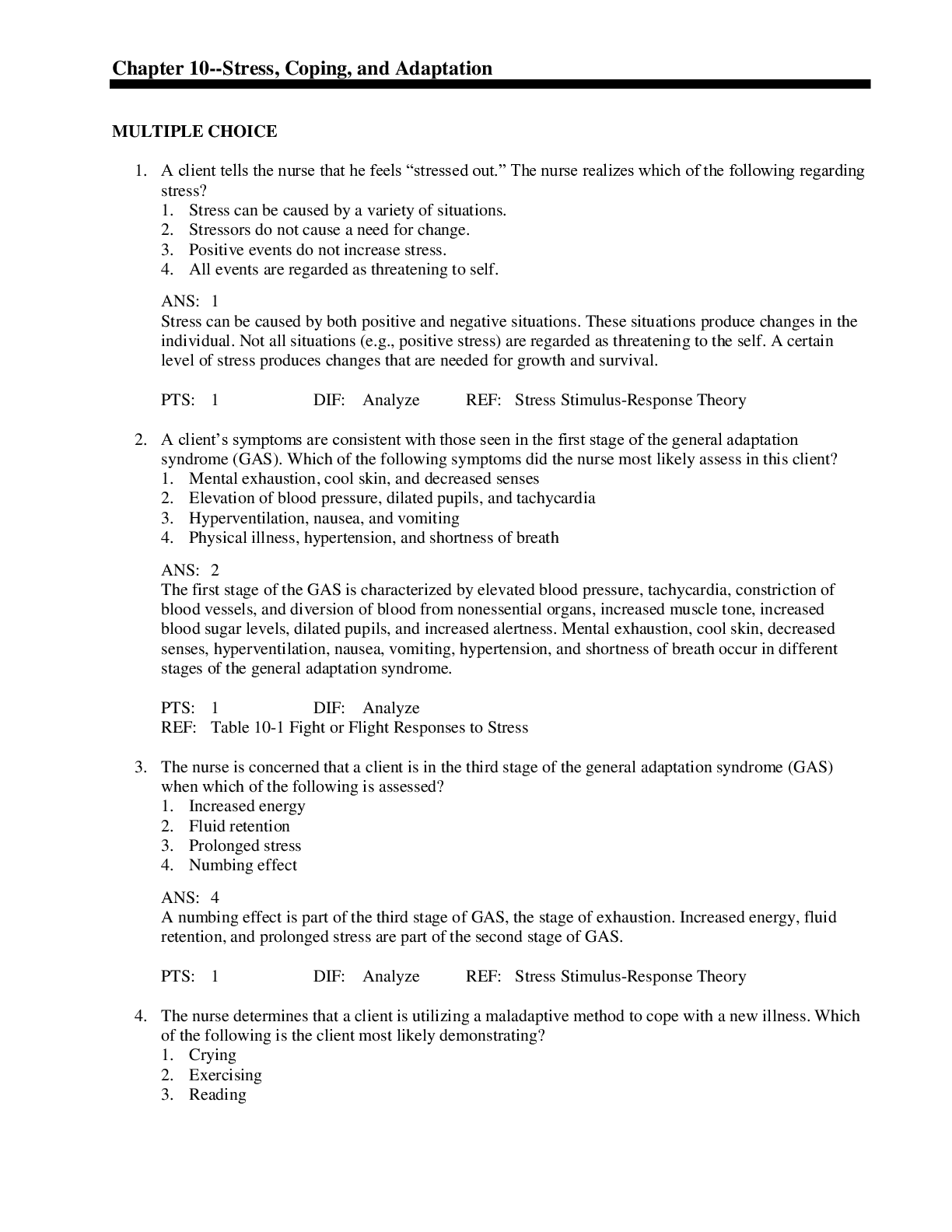
Reviews( 0 )
Document information
Connected school, study & course
About the document
Uploaded On
Jan 21, 2020
Number of pages
6
Written in
Additional information
This document has been written for:
Uploaded
Jan 21, 2020
Downloads
0
Views
82

